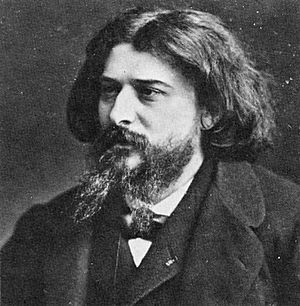Alphonse Daudet facts for kids
Quick facts for kids
Alphonse Daudet
|
|
|---|---|
 |
|
| Born | 13 May 1840 Nîmes, France |
| Died | 16 December 1897 (aged 57) Paris, France |
| Occupation | Novelist, short story writer, playwright, poet |
| Literary movement | Naturalism |
| Spouse | Julia Daudet |
| Children | Léon Daudet;
Lucien Daudet; Edmée Daudet |
| Signature | |
Alphonse Daudet (born May 13, 1840 – died December 16, 1897) was a famous French writer. He wrote many novels, short stories, and plays. He was married to Julia Daudet and had three children: Edmée, Léon, and Lucien Daudet.
Contents
Alphonse Daudet's Early Life
Alphonse Daudet was born in Nîmes, France. His family was part of the middle class. His father, Vincent Daudet, owned a silk factory. However, his father often faced bad luck and failures in business.
Alphonse had a difficult childhood. He often skipped school. In 1856, he left Lyon and started working as a schoolteacher in Alès, France. He found this job very hard. He later said that for months after leaving, he would wake up scared, thinking he was still with his unruly students. These experiences inspired his novel Le Petit Chose.
In November 1857, he stopped teaching. He moved to Paris to live with his older brother, Ernest Daudet. Ernest was trying to become a journalist. Alphonse started writing too. His first book of poems, Les Amoureuses (1858), was well-received. He then got a job at a newspaper called Le Figaro. He also wrote a few plays. Soon, people in the literary world began to notice his talent.
Morny, a powerful minister for Napoleon III, hired Daudet as one of his secretaries. Daudet worked for Morny until Morny's death in 1865.
Alphonse Daudet's Writing Career
In 1866, Daudet's book Lettres de mon moulin (Letters from My Windmill) became very popular. He wrote these stories near Paris, but they talked about a windmill in Provence. His first longer novel, Le Petit Chose (1868), was about his own early life. It was written with much grace and emotion.
The year 1872 brought his famous book, Aventures prodigieuses de Tartarin de Tarascon. He also wrote the play L'Arlésienne. But it was Fromont jeune et Risler aîné (1874) that made him truly famous. This book introduced a new style of writing in French literature. His characters felt very real and typical of people you might meet.
His next novel, Jack (1876), was about a child who suffered because of his mother's selfishness. This book further showed his skill. From then on, Daudet was a very successful writer. He spent most of his time writing novels like Le Nabab (1877), Les Rois en exil (1879), Numa Roumestan (1881), and Sapho (1884). He also wrote for the stage. He shared memories in Trente ans de Paris (1887) and Souvenirs d'un homme de lettres (1888).
These books, along with the three Tartarin stories (Tartarin de Tarascon, Tartarin sur les Alpes, Port-Tarascon), and his short stories, make up his main life's work. Many of his short stories were written before he became famous.
One of his novels, L'Immortel (1888), was a strong criticism of the Académie française. This was a famous French academy that Daudet never joined. Daudet also wrote books for children, such as La Belle Nivernaise. This story is about an old boat and its crew.
In 1867, Daudet married Julia Allard. She was also a writer. Alphonse Daudet passed away in Paris on December 16, 1897. He was buried in Père Lachaise Cemetery.
Major Works by Alphonse Daudet
Here are some of Alphonse Daudet's most important works:
- Les Amoureuses (1858; poems)
- Le Petit Chose (1868; Little Good-For-Nothing)
- Lettres de Mon Moulin (1869; Letters from my Mill, short stories)
- Tartarin de Tarascon (1872; Tartarin of Tarascon)
- L'Arlésienne (1872; a play)
- Contes du Lundi (1873; The Monday Tales, short stories)
- Fromont jeune et Risler aîné (1874; Fromont Junior and Risler Senior)
- Jack (1876)
- Le Nabab (1877; The Nabob)
- Les Rois en Exil (1879; Kings in Exile)
- Numa Roumestan (1880)
- Sapho (1884)
- Tartarin sur les Alpes (1885; Tartarin on the Alps)
- La Belle Nivernaise (1886; for young readers)
- L'Immortel (1888; One of the Forty)
- Port-Tarascon (1890; Port Tarascon)
- The Last Lesson (a short story)
Images for kids
-
Daudet's mill
See also
 In Spanish: Alphonse Daudet para niños
In Spanish: Alphonse Daudet para niños
 | Laphonza Butler |
 | Daisy Bates |
 | Elizabeth Piper Ensley |



